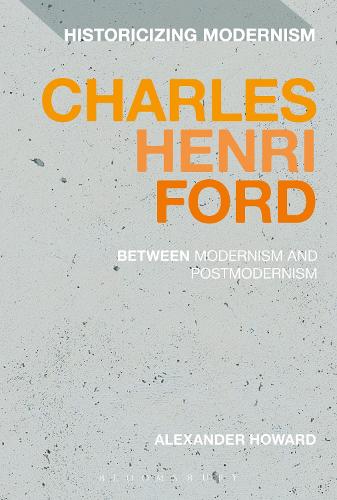
Charles Henri Ford: Between Modernism and Postmodernism
(Hardback)
Available Formats
Publishing Details
Charles Henri Ford: Between Modernism and Postmodernism
By (Author) Dr Alexander Howard
Bloomsbury Publishing PLC
Bloomsbury Academic
18th May 2017
United Kingdom
Classifications
Tertiary Education
Non Fiction
Literary studies: c 1900 to c 2000
811.52
Physical Properties
Hardback
264
Width 160mm, Height 236mm, Spine 24mm
540g
Description
The first American surrealist poet, a prolific literary editor and a seminal influence on the New York School of poetry, Charles Henri Ford was a key figure in the transition from late modernist to postmodern culture in America. Charles Henri Ford: Between Modernism and Postmodernism is the first book-length scholarly study of this important literary figure. Drawing on new archival research including explorations of Fords correspondence with the likes of Ezra Pound, Gertrude Stein, William Carlos Williams, Parker Tyler, and many others the book explores the full impact of Fords contribution to 20th-century American literary culture.
Reviews
Alexander Howards pathbreaking study of the life and work of the sadly neglected Charles Henri Ford is much more than a simple recuperation of lost value. It dextrously navigates the categorial coral reefs growing up over the wrecks of modernism and postmodernism both, and establishes some eye-opening passages between and among them, where the reef-fish teem and school. Howards Ford is a multiform experimentalist, queer icon, regional surrealist, late-modernist mentor, and sociable internationalist, who tirelessly offered his torsional character to those movements and causes that could use his energy. His longevity turns out to be a key to the broken clocks of modernity, with which he tinkered and played in an amazing series of works to which we now have the most reliable guide. * Julian Murphet, Ph.D. FAHA, Scientia Professor in English and Film Studies, Director, Centre for Modernism Studies in Australia, School of the Arts and Media, UNSW Australia *
Alexander Howard hopes that Charles Henri Fords uncredited role in U.S. avant-garde traditions will one day be properly acknowledged. That day dawns already in Howards compelling book. Its portrait of the artist exhibits Fords traversal of seventy years of aesthetic movements. By turns exemplifying modernism, the modernist little magazine, queer immoralism, surrealism, Beat poetics, pop art, camp, postmodernism, and New York School poetry, and by turns revising them too, Fords career constitutes an object lesson in the metamorphic complexity of literary history. The lesson is made available to us thanks to Howards brilliant revelation of Fords interests and writings as a hidden chain that links together some of the last centurys most notable American cultural productions. * Robert L. Caserio, Professor of English, Comparative Literature, and Womens, Gender, and Sexuality Studies, The Pennsylvania State University, University Park *
In the end, everything is a question of personality. So states second-generation modernist Charles Henri Ford in 1958. Drawing on newly unearthed archives, Howard meticulously uncovers how Ford cultivated his own spectacular individuality. Americas first surrealist-cum-Imaginationist, Ford was poet, visual artist, and self-described genius; his aesthetic daring was matched by his prescient sexual politics. Fords epistolary lan alone sparks interest: he corresponded, collaborated, and frequently fought with the likes of Pound, Stein, Barnes, Breton, Warhol, and Brakhage. Howards work importantly recovers this wry, innovative, and influential figure for the annals of vanguardism. * Dr Sara Crangle, Reader, School of English University of Sussex Brighton, UK *
Author Bio
Alexander Howard is Lecturer in Writing Studies at the University of Sydney, Australia.
